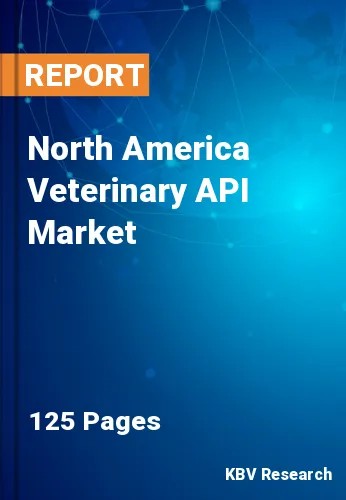
The North America Veterinary API Market would witness market growth of 5.7% CAGR during the forecast period (2023-2030).
The production of veterinary active pharmaceutical ingredients entails the synthesis of APIs from basic materials using various high-tech processing techniques. Anti-infectives, vaccines, and nonsteroidal anti-inflammatory drugs are the principal products of veterinary active pharmaceutical ingredient production. It is expected that an increasing number of pet owners will drive the development of the market in the coming years. Pet proprietors are those who own or adopt a companion animal. The fact that pet owners provide essential health care for their animals increases the demand for veterinary medications.
The launch of biologically synthesized APIs is an advancement in technology that contributes to the expansion of the industry. In the future, veterinary biopharmaceuticals produced by rDNA technology will be a more viable option for treating diseases such as arthritis, cancer, and diabetes, as well as autoimmune disorders. In addition, introducing high-potency APIs (HPAPIs), which act on target cells at a much lower dosage than standard APIs, is anticipated to create lucrative possibilities for expansion in the market. The HPAPIs are causing significant alterations in the pharmaceutical industry's ability to develop novel therapeutic drugs.
In March 2022, Mainstreet Animal Hospital in Canada published an article on Primary Veterinary Care that discussed the numerous pet-related complications and their management. According to the article, old age significantly contributes to the advent of chronic diseases like osteoarthritis, heart disease, renal disease, endocrinological disorders, etc. The increasing prevalence of chronic diseases in veterinary animals and the need for appropriate medical management, such as the provision of effective medications for afflicted animals, are likely to drive market expansion in the region. Consequently, all of the factors above, such as the rise in pet ownership and the prevalence of chronic diseases in animals, are anticipated to bolster the regional market over the forecast period.
The US market dominated the North America Veterinary API Market by Country in 2022, and would continue to be a dominant market till 2030; thereby, achieving a market value of $3,286.9 million by 2030. The Canada market is experiencing a CAGR of 8.1% during (2023 - 2030). Additionally, The Mexico market would exhibit a CAGR of 7.1% during (2023 - 2030).
Based on Route of Administration, the market is segmented into Oral, Injectable, Topical and Others. Based on API Type, the market is segmented into Parasiticides, Anti-inflammatory, Antimicrobials, Vaccines, Hormones and Others. Based on Synthesis Type, the market is segmented into Chemical based API, Biological API and Highly potent API. Based on Animal Type, the market is segmented into Livestock Animals and Companion Animals. Based on countries, the market is segmented into U.S., Mexico, Canada, and Rest of North America.
Free Valuable Insights: The Worldwide Veterinary API Market is Projected to reach USD 12.9 Billion by 2030, at a CAGR of 6.4%
The market research report covers the analysis of key stake holders of the market. Key companies profiled in the report include Boehringer Ingelheim International GmbH, Zoetis, Inc., Elanco Animal Health, Inc., Merck & Co., Inc., Virbac, Vetoquinol SA (Soparfin SCA), Sequent Scientific Limited, Phibro Animal Health Corporation, Febbrica Italina Sintetici S.P.A. (Nine Trees Group S.p.A) and Excel Industries Limited.
By Route of Administration
By API Type
By Synthesis Type
By Animal Type
By Country
Our team of dedicated experts can provide you with attractive expansion opportunities for your business.
